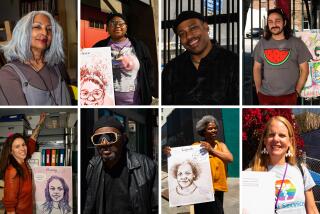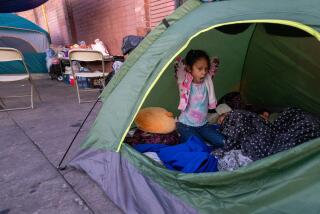History, Told in a Painfully Personal Way
HOUSTON — Shari Smothers was having an intimate conversation with her brother Kemic about life’s small details -- the little moments he had never stopped to appreciate but now missed so deeply.
The hard-charging lawyer had never given much thought to the clerks and the bailiffs who greeted him with smiles at the courthouse in New Orleans every morning, asking about his pregnant wife, his 2-year-old son, the rest of his family.
But since Hurricane Katrina, he said, he had found himself wondering what happened to those courthouse workers. Then he began to cry.
“The interactions that you have with people that leave you with a pleasant feeling -- we take that for granted,” said Kemic, 39, who now lives in Stafford, Texas, with his family.
Across the dining room table, Smothers stared at her brother -- not because he was sobbing, but because he seemed shocked by his own emotion.
The siblings’ heartfelt conversation about Katrina was not just for themselves. Smothers, an amateur folklorist, was recording her brother’s story for the sake of history.
The firsthand account is one of hundreds collected by hurricane evacuees interviewing each other as part of an oral history project called “Surviving Katrina and Rita in Houston.” (Katrina devastated the Gulf Coast last year on Aug. 29; Rita on Sept. 24.)
The stories are bound for the Library of Congress in Washington, where they will take their place alongside other priceless personal chronicles of Americana, including man-on-the-street interviews describing the attack on Pearl Harbor, and the powerful blues music of a prisoner nicknamed Leadbelly.
The project is believed to be the first large-scale effort in which victims of a major disaster have taken the lead in chronicling it. That twist makes some interviews sound unpolished, but it gives them a raw authenticity that experts say trained historians could never achieve.
There are ruminations on death and loss, and joyful celebrations of lives saved from the floodwaters. There are expressions of eternal gratitude for the kindness of strangers, and anger over the stereotyping of evacuees.
On Labor Day, Smothers recorded an interview with Cedric Brown, a 21-year-old college dropout from New Orleans who was struggling to find a job in Texas.
Without a trace of emotion, Brown recounted a now-familiar tale of hardship: watching water seep through the floorboards of his mother’s house; helping his 75-year-old great-aunt wade to higher ground; surviving the Superdome; being put on a plane to San Antonio while half his family boarded a bus to Houston.
Then he alluded to the sentiment among many Houstonians that it is time for evacuees to go home, and the weariness in his voice began to betray his emotions.
“From the way we dress to the way we talk, we get singled out so easily,” he said. “And that’s not a good thing, because they’re not happy about us being here.”
Smothers, 42, who fled Katrina with her elderly parents, could relate. She too had found it hard to get a job somewhere besides McDonald’s, despite having a master’s degree. She too was offended by characterizations of evacuees as murderers and thugs. She too knew how it felt to miss New Orleans.
“How can you live in America and tell people to go home when they have no home to go to?” Smothers asked afterward. “If more people heard these stories, they would not think that way.”
Carl Lindahl, a University of Houston professor and folklorist, thought up the survivor project while working as a volunteer at Houston’s George R. Brown Convention Center, where he helped bedraggled evacuees arriving from New Orleans find shirts, pants and underwear. He noticed that what they sometimes needed most was to tell someone what had happened to them.
One skinny man in particular left a deep impression on him. The man said he was one of eight people trapped in a building for four days. As the youngest and strongest -- he was in his 50s -- it fell on him to find food and water for the others. So every day, he went out a second-story window, swam through the muck, broke into a drugstore, and lugged food and water back to the others with a harness he had made out of coat hangers and rope.
Lindahl was so stunned, he didn’t get the man’s name.
“In my 30 years of collecting folk tales, I had never seen anything like this,” said Lindahl, 58. “I think for many of these people, they were not even sure they believed what they had just been through.”
From his experience, which included compiling accounts of Pearl Harbor and the Dust Bowl migration, Lindahl knew the most moving stories were usually those told by one survivor to another, or by a parent to a child.
Lindahl realized there was a special opportunity in Houston, which had about 250,000 evacuees at one point, to put his idea to the test. He teamed up with veteran Austin folklorist Pat Jasper, secured funding from a foundation and support from the Library of Congress, and began to assemble a team of evacuees to go get stories.
Experts from the library’s American Folklife Center helped conduct training sessions on the art of recording an honest tale, emphasizing that the ideal was an easygoing “kitchen table” story, not a confrontational “60 Minutes” interview.
So far, about 40 participants have collected about 300 stories. The interviewers are paid an average of $2,250 -- including $150 for each interview. For many, that money was initially the allure. The day she talked to Lindahl about the interviewing job, Smothers recalled, she had had a dispiriting conversation with the Louisiana unemployment office. But the chance to interact with other New Orleans expatriates soon surpassed the monetary reward.
“Many people from New Orleans come from these very tightknit, long-lived neighborhoods, and now that they are spread out in a big city like Houston, one of their biggest complaints is not feeling the sense of community they once had,” Jasper said. “In a small way, by forming these field schools and sending people out into the community, I think we’ve helped people feel less marooned.”
Most took to the task with vigor, motivated by a passionate feeling that the stories needed to be heard, not only today, but 100 years from now.
“My entire family’s moved away from New Orleans. My home was destroyed, my job was destroyed,” said interviewer Dione Morgan, 27, a former New Orleans teacher who plans to stay in Houston.
“But I will be 504 for life,” she added, identifying herself with the Crescent City’s area code. “Those people will always be my people. By doing these interviews, I think I did my part to help them, or at least make sure they’re never forgotten.”
If a theme emerges from the oral histories, it is not a sense of sadness over the lives ended or upended, but a feeling of nostalgia for a New Orleans that many think will never exist again.
“They call it the voodoo of New Orleans,” said interviewer Glenda Harris, 48, a former head of an advocacy group in the city’s Lower Ninth Ward. Harris remains in touch with many of those whose stories she recorded. “There was a sense of place in those old New Orleans neighborhoods that you just don’t find in these big apartment complexes in Houston.”
More to Read
Sign up for Essential California
The most important California stories and recommendations in your inbox every morning.
You may occasionally receive promotional content from the Los Angeles Times.










